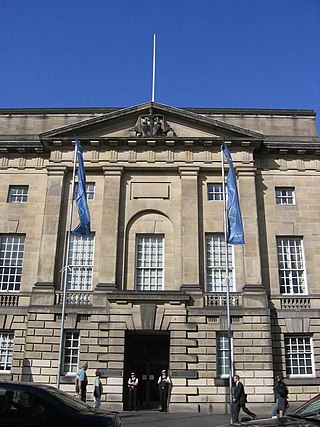Loading AI tools
Supreme courts of Scotland From Wikipedia, the free encyclopedia
The College of Justice (Scottish Gaelic: Colaiste a' Cheartais) includes the Supreme Courts of Scotland, and its associated bodies.
| College of Justice | |
|---|---|
 | |
| Established | 1532 |
| Jurisdiction | Scotland |
| Location | Edinburgh |
| Composition method | Judges are appointed by the Monarch on the recommendation of the First Minister, who receives recommendations from the Judicial Appointments Board for Scotland[1] |
| Appeals to | Supreme Court of the United Kingdom |
| Judge term length | Mandatory retirement at age 75 |
| Lord President and Lord Justice General | |
| Currently | The Rt Hon Lord Carloway |
| Since | 2015 |
| Jurist term ends | 2029 |
| Lord Justice Clerk and President of the Second Division of the Inner House | |
| Currently | The Rt Hon Lady Dorrian |
| Since | 2016 |
| Jurist term ends | 2032 |

The constituent bodies of the national supreme courts are the Court of Session, the High Court of Justiciary, the Office of the Accountant of Court, and the Auditor of the Court of Session.[2][3][4] Its associated bodies are the Faculty of Advocates, the Society of Writers to His Majesty's Signet and the Society of Solicitors in the Supreme Courts of Scotland.
The College is headed by the Lord President of the Court of Session, who also holds the title of Lord Justice General in relation to the High Court of Justiciary, and judges of the Court of Session and High Court are titled Senators of the College of Justice.
The college was founded in 1532 by King James V following a bull issued by Pope Clement VII on 15 September 1531. It provided for 10,000 gold ducats to be contributed by the Scottish bishoprics and monastic institutions for the maintenance of its members, one half of whom would be members of the "ecclesiastical dignity".[5]
| College of Justice Act 1532 | |
|---|---|
| Act of Parliament | |
 | |
| Long title | Concerning the ordour of Justice and the institutioun of ane college of cunning and wise men for the administracioun of Justice. |
| Citation | c. 2 [12mo ed: 1537 cc. 36–41] |
| Dates | |
| Royal assent | 17 May 1532 |
| Other legislation | |
| Amended by | |
Status: Amended | |
| Text of the College of Justice Act 1532 as in force today (including any amendments) within the United Kingdom, from legislation.gov.uk. | |
The Parliament of Scotland passed the College of Justice Act 1532 (c. 2) on 17 May 1532 authorising the creation of the college with 14 members, half spiritual, half temporal, plus a president and the Lord Chancellor. The college convened for the first time on 27 May 1532, in the royal presence.
Supplementing the 14 ordinary lords, who were called senators, were an indefinite number of supernumerary judges called extraordinary lords.
The founding members of the College of Justice were:
The college at its foundation dealt with underdeveloped civil law. It did not dispense justice in criminal matters as that was an area of the law reserved to the king's justice, through the justiciars (hence the High Court of the Justiciary), the Barony Courts and the Commission of Justiciary. The High Court of Justiciary was only incorporated into the College of Justice in 1672.
Initially, there was little legal literature. Acts of the Parliament of Scotland and the books of the Old Law as well as Roman Law and canon law texts were about all to which the pursuer and defender could refer. It was only after the establishment of the court that this situation improved, with judges noting their decisions in books of practicks.
The Treaty of Union 1707 with England preserved the Scottish Legal System. Article XIX provided "that the Court of Session or College of Justice do after the Union and notwithstanding thereof remain in all time coming within Scotland, and that the Court of Justiciary do also after the Union ... remain in all time coming."
Seamless Wikipedia browsing. On steroids.
Every time you click a link to Wikipedia, Wiktionary or Wikiquote in your browser's search results, it will show the modern Wikiwand interface.
Wikiwand extension is a five stars, simple, with minimum permission required to keep your browsing private, safe and transparent.